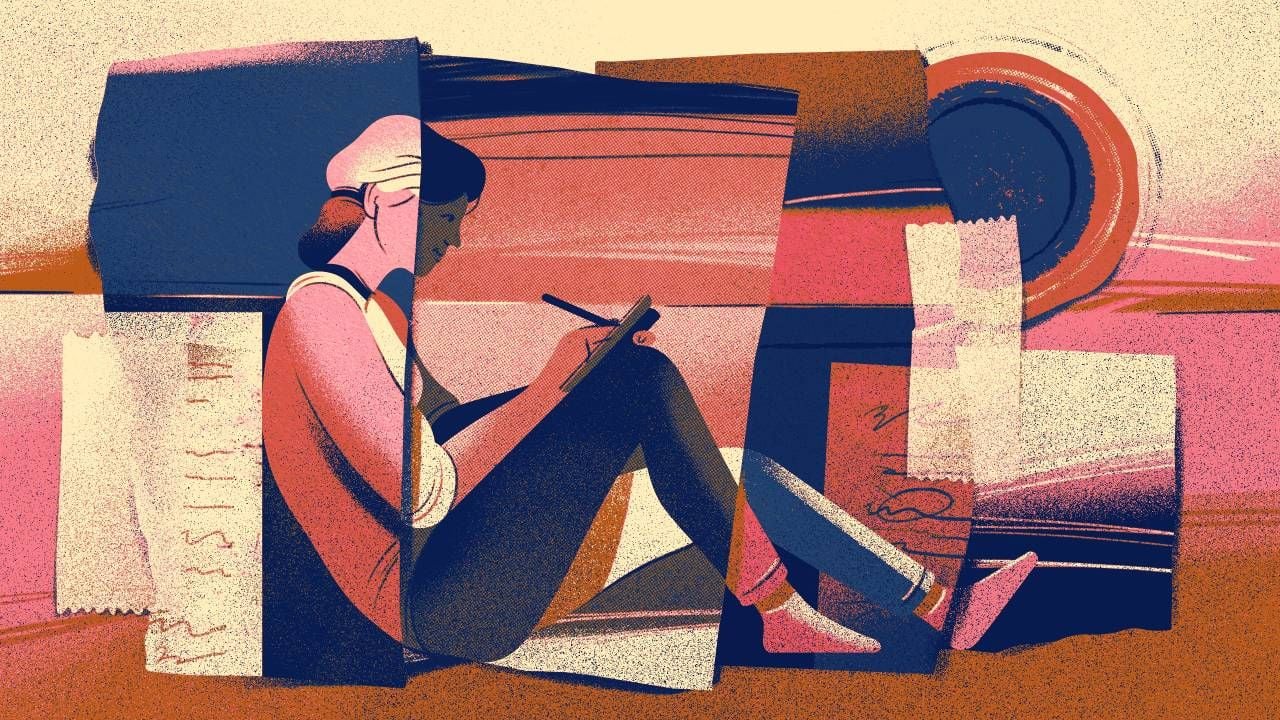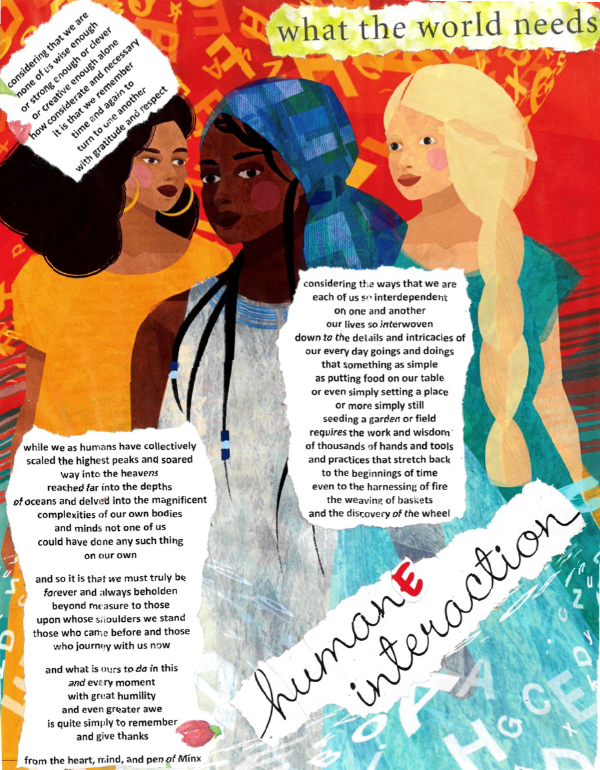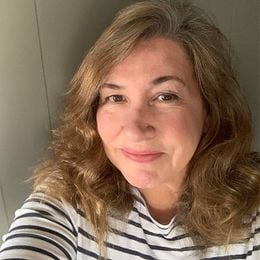Play With Your Words: A Poetry Mini-Guide
Learn about 'found poetry' and glean wisdom from students who took the creative risk to explore something new
Every week during "Poetry Everywhere: Collage, Erasure, and Found Poetry," the six-week online Next Avenue Arts Learning Course, poet and teaching artist Zoë Bird would send out a new packet of information to students.

Week One contained inspiration from several well-known poets, including this from Carl Sandburg: "Poetry is the opening and closing of a door, leaving those who look through to guess about what is seen during the moment."
Bird's class was all about finding that door and showing students how to enter, or in some cases re-enter, the world of poetry.
"She told me she hadn't written poetry since high school and was having a blast doing it again."
According to Bird, participants ranged from published writers to "people who have always wanted to write poetry but had never dove in before."
She tells of one student who spoke of re-discovering the joy of writing poetry.
"She told me she hadn't written poetry since high school and was having a blast doing it again," said Bird. "All the intimidation had been taken out of it."
Exploring Different Forms of Found Poetry
Erasure Poetry: No Need to Start With a Blank Page
As Bird explained in this August 2021 interview with Next Avenue, one of the poetic forms she particularly liked exploring during the pandemic was erasure poetry – words or phrases of existing text are taken away, or "erased," leaving new ideas behind. In her case, the filled page she began with was The New York Times Page-A-Day Crossword Puzzle.
One of Bird's students, Minx Boren, who lives in Palm Beach, Fla., has already had several books of poetry published; she had never tried erasure poetry before and enjoyed this new way of creating.

"Rather than starting with a blank page, which can be intimidating, you start with more words than you need and you can be creative in how you cross them out," she said.
Amy Paloski, who lives outside Columbia, Md., is also an author (writing under the name Amy Soscia, she primarily writes short stories, but is currently working on a novel) and said that in the past, writing poetry "always scared the life out of me." That all changed when she participated in a writers' retreat four years ago and began subscribing to several online poetry channels.
Found poetry was a new experience for her, and she enjoyed working on cento and erasure poems (more on cento poems below).
"Eliminating text to create something new is very satisfying. By restructuring what's on the page, it's surprising to discover what you can create," said Paloski, who plans to continue building on what she learned in the course. (See one of her recent collage poems at the end of this story.)
Tip: When you are working on an erasure poem, not only can you take away text (literally by crossing out letters, words or phrases with a pencil or pen), you can replace it with your new text.
Cento Poetry: Have Fun With Other People's Words
The cento poetry form is part of the collage family, where words taken from other sources are re-assembled to create something new.
Here's an example of a cento poem by Boren that was one of the projects she most enjoyed completing during Bird's class:
there is a hush that happens
in anticipation of a poem
something quiet that stirs
inside in readiness
wanting to meander
or better yet
burst onto the page
will I get it down
before it evaporates
or better yet
will I allow it to find
its own rhyme and rhythm
and simply scribe some
essential flow of words
without mindless interference
from my chattering head
will it be inspiring
or better yet
prophetic or better yet
real
will it be impressive
or better yet
appealing or better yet
revealing
will I glimpse
some great truth
or better yet
some great awareness
or better yet
some quiet inkling
from my heart of hearts
shhhhhhhhhhh
stay
still
wait
now
Tip: In her packet describing cento poetry, Bird included this explanation: "One possibility for the cento is to gather favorite lines or phrases from a single poet or writer as a way of studying, reinterpreting or paying homage to their work." In other words, you could put together a piece of your choosing using the poetry of Walt Whitman, Shel Silverstein or Joy Harjo, poet laureate of the United States.
More Collage Poetry: Inspiration From a Variety of Sources
As Bird defined it for the students, collage poetry involves "composing poems with words and phrases plucked from the aural and visual environment: overheard conversations, lines gleaned from radio, TV or movies; signage, graffiti and words from crosswords, text and voicemail messages, social media posts, headlines, advertising, etc."
Using a notebook and pen or a scissors and glue, phrases and images (photos or other types of visual art) can be curated together into a fresh and new piece.
Boren said she has started keeping a drawer full of supplies, along with a stack of magazines, handy when she's inspired to create a collage poem like the one in this story – taken from the pages of the July/August 2020 issue of Oprah magazine.
Tip: You don't have to mine the words of others to create a collage poem. As Bird suggests, perhaps "you have a poem or poems, or a work of prose, that you're not quite satisfied with or have had trouble finishing" — these could all be fodder for a collage poem. If you're a journal keeper, try pulling out words from some of your past entries to create something new.
Further Thoughts on Found Poetry: Unexpected Discoveries
Michael O'Neal, an anthropologist who lives in the British Virgin Islands, first discovered the concept of found poetry in a New York Times story early in the pandemic.
"I decided to try it, so I found an article about yoga, although I don't practice it, and took the words from that story to create a new piece titled 'Yoga Is for Everybody,'" he said.
O'Neal also found a correlation between some of the theories of scholars who have influenced him over the years and this world of found poetry. He specifically mentions Kamau Brathwaite, the historian and poet who died in 2020.
"Brathwaite said 'too often we disregard the face within the archive' which I take to mean an emphasis on paying attention to the unattended," says O'Neal. "Found poetry is very much in keeping with that – not immediately seeing things that are there."
Tip: Three more ideas for creating found poetry from the Lantern Review Blog, April 2020, that Bird shared with students:
- Stack up some books with their spines facing out and use their titles to make a poem.
- Translate a classic poem into all emojis, word by word.
- Write a list of things that you’ve forgotten. Then turn that list into a poem.
Creativity, Connection and Finding Your Muse
"There was great energy in this group," said Bird of the online poetry class. "There was a lot of support among everyone, and some of the students commented how much they learned from each other."
In a phone conversation, O'Neal shared how the devastation of two major hurricanes in the British Virgin Islands in 2017 – Irma and Maria – literally upended some of his writing projects.
"The roof of the house blew off. In the spare room, I had archives of transcribed interviews for a book, and all of those notes were gone," he said. "I had a long period of angst trying to think about what was next. What should I do if and when the muse returns?"
Being part of this course, O'Neal said, has shown him "one's muse can take various forms" adding that he plans to continue writing poetry. He's already ordered several books about poetry, including on the cento format, which he particularly enjoyed.
During the course, Boren was being treated for cancer (she's doing well now) and was seeking a creative outlet to take some focus off her health.
"I've been writing poetry every day for years, but this class was appealing because it's always nice to do something different," she said.
Paloski, who is part of several Zoom literary groups, said the online format does allow people from across the country (and in this case, the world – in addition to O'Neal in the British Virgin Islands, there was a student from South Africa) to make connections around topics like poetry.
"It's an opportunity to get to know someone you won't ever get to know," Paloski said.
Where Should You Begin?
If you're interested in trying your hand at found poetry, Bird has a piece of advice: let yourself play – with words, images, lines and ideas.
Something Bird often emphasized to her students is that there is no right way – or wrong way – to write poetry.
As she found with the students in this group, whom she said "pushed themselves mightily out of their comfort zones," but were happy to do so, the process of discovery is meant to be enjoyed.
"The way for inspiration to arrive is just to do it," Bird said. "Poetry is out there to grab."
Travel Your Road
By Amy Soscia
Old Soul,
change your road.
Let your senses find new experiences.
Free your sacred spirit from the earth.
The heart must be opened
and everything told.


